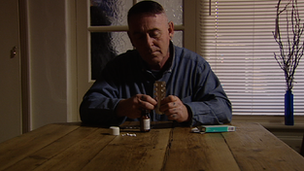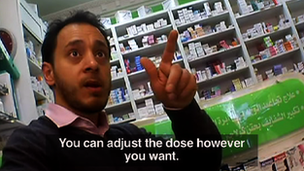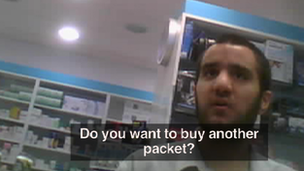Pharmacists illegally sell Valium and morphine
- Published
Nine pharmacists accepted cash for prescription-only medicines
The government faces "urgent" calls to overhaul pharmacy regulation after a BBC investigation exposed numerous chemists illegally selling dangerous and addictive drugs.
Undercover reporters were sold Valium, opiates and other controlled drugs without prescription at nine pharmacies.
Shadow health secretary Andy Burnham MP has demanded an urgent review, claiming watchdogs may not be "fit for purpose".
The Department of Health insisted it was tackling prescription drug abuse.
It is illegal for pharmacists to sell prescription-only drugs without a prescription unless it is a medical emergency.
Those convicted face a maximum penalty of two years in jail and an unlimited fine.
But several London pharmacies sold the BBC's Inside Out programme diazepam or its trade name drug Valium - a strong and addictive sedative in the benzodiazepine family - for up to £85.
The BBC was acting on specific intelligence about the pharmacies.
Latest figures show 293 people died in 2011 from misuse of benzodiazepines, more than double the 125 killed by cocaine and ecstasy combined.
Islington-born Josh Jarrett, 51, a supported housing officer, was prescribed Valium as a boy for hyperactivity.
After 44 years addicted to benzodiazepines he says his life has been ruined.
Withdrawal causes hyperventilation, panic attacks, vomiting and seizures.
Mr Jarrett said: "I'd rather somebody lop my arm off than take my medication from me.
'Dangerous drug'
"I cannot think of worse torture than withdrawal from benzodiazepines, which - for me - are legally prescribed.
"I just cannot believe a pharmacist you respect for their knowledge would even consider giving such a dangerous drug over the counter."
Temazepam is a stronger benzodiazepine, popular with heroin users wanting to come down.
It must be kept under lock and key due to its potential for abuse.
Yet at Curie Pharmacy in Maida Vale, west London, the BBC bought temazepam with ease.

Josh Jarrett has been addicted to benzodiazepines for 44 years
For £200, Al Farabi Pharmacy in Paddington dispensed a bottle of Oramorph - containing morphine.
An NHS prescription would cost about £7.50.
The pharmacist called the opiate - closely related to heroin - "the strongest possible".
Dr William Shanahan, of Central and North West London NHS Trust, said: "The pharmacists are putting patients' lives at huge risk - it's disgraceful, reprehensible and inexcusable."
All nine pharmacies sold the antibiotic amoxicillin.
Environmental health consultant Dr Yunes Ramadan Teinaz said: "Antibiotics - when misused - can stop working for everyone else.
"You or I may have developed resistance because of the foolish actions of these pharmacists.
"There are very real dangers to the wider community."
'Lost for words'
Confronted with the evidence, none of the pharmacies provided an explanation.
After viewing the footage, shadow health secretary Andy Burnham said: "Quite frankly I was lost for words.
"People will be shocked to see pharmacists acting like small time drug pushers."

This chemist advised the researcher to take whatever dose of morphine he wanted
Over a few weeks, researchers bought 288 Valium tablets, 21 temazepam tablets, 294 amoxicillin tablets, 24 Viagra tablets and one bottle of Oramorph, by making simple requests.
Yet the BBC has learned the General Pharmaceutical Council (GPhC) has taken just one pharmacy in England to a fitness to practise hearing for selling drugs without a prescription in 2012.
The organisation says it is investigating other pharmacies, but refused to provide numbers, claiming this would endanger the inquiries.
Mr Burnham said: "It's for the government now to order a review into whether the system of regulation is doing a job for pharmacies to be acting in this way."
The Inside Out investigation also highlights:
• An admission the GPhC does not routinely compile figures for the number of pharmacies caught unlawfully selling drugs - meaning there is no overall picture of how widespread the problem is.
• Nor does it do 'secret shopper' tests without prior suspicion - unlike councils, which carry out blind checks using minors on shops selling alcohol or cigarettes.
• Concern that Temazepam and Valium are not policed to anything like the degree of drugs such as methadone, which is routinely audited by the authorities.
• Worries within the industry at the confusing enforcement system, with two separate watchdogs - the GPhC and the Medicines and Healthcare products Regulatory Agency (MHRA).
Mr Burnham responded: "From what's been revealed here, the way we regulate our high street pharmacies is not tough enough.
"This is unacceptable on every level. There has to be a proper look at whether the system that regulates pharmacies is fit for purpose."

When confronted with the evidence none of the pharmacists made a comment
Health Minister Lord Howe said: "Dependence on prescription medicines can be every bit as damaging and distressing as any other type of addiction.
"We are working with the Royal College of GPs to tackle dependence on prescription and over-the-counter medicines."
Duncan Rudkin, chief executive of the GPhC, said: "We will investigate any concerns brought to our attention.
"We are already investigating a number of allegations that pharmacies in London have supplied medicines illegally and would urge anyone with concerns to contact us.
"We have powers to take action including removing a pharmacist's right to practise."
The BBC will be handing the medicines it was sold illegally over to the authorities.
BBC Inside Out is on BBC One in the London region on Monday, 17 December at 19:30 GMT and nationwide on the iPlayer for seven days following transmission.
- Published17 December 2012
- Published2 November 2011
- Published24 August 2011